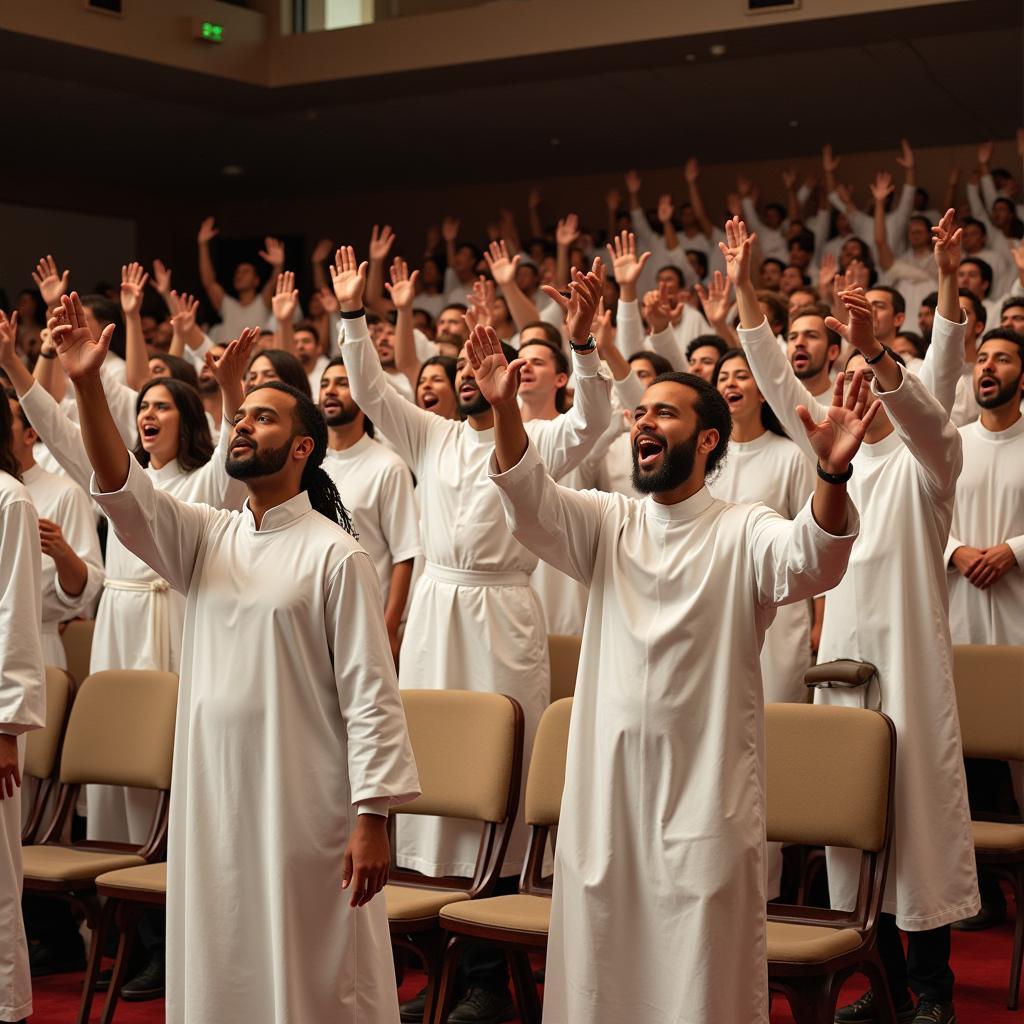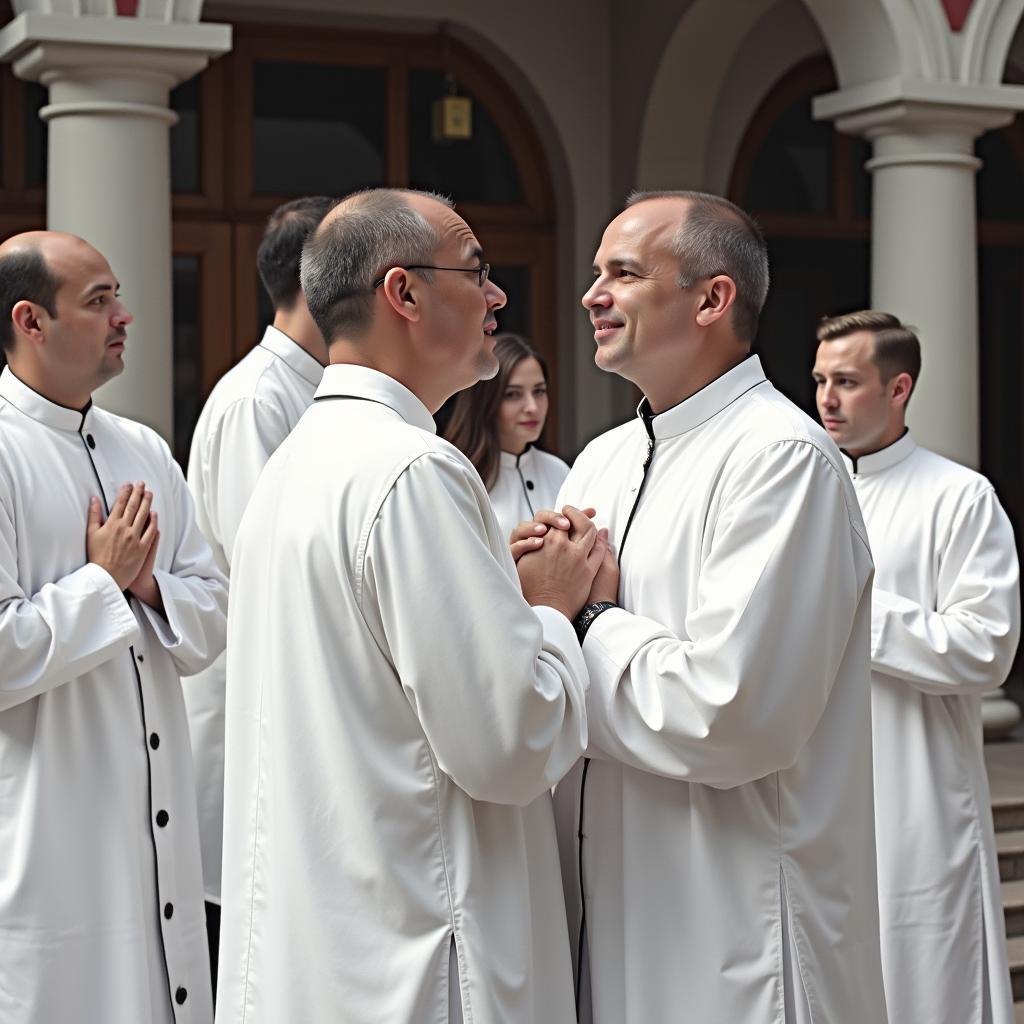Exploring the African Apostolic Church: History, Beliefs, and Practices
The African Apostolic Church (AAC) is a fascinating and vibrant independent African initiated church. This article delves into its rich history, core beliefs, and unique practices, offering a comprehensive overview of this significant religious movement.  Members of the African Apostolic Church worshipping in a lively service
Members of the African Apostolic Church worshipping in a lively service
A Journey Through the History of the AAC
The AAC, founded in 1917 by Paul Mwazha of Zimbabwe, emerged during a period of significant social and political change in Southern Africa. Mwazha, having experienced a profound spiritual awakening, began preaching a message of repentance, healing, and the imminent return of Christ. His teachings resonated with many Africans seeking spiritual solace and a sense of identity amidst colonial rule. The church quickly spread beyond Zimbabwe’s borders, establishing a strong presence in countries like Zambia, Mozambique, and South Africa.
Key Figures and Early Development
Paul Mwazha is considered the spiritual father and founder of the AAC. His leadership was instrumental in shaping the church’s doctrine and practices. The early development of the AAC was marked by both rapid growth and challenges, including navigating the complexities of colonial authority and establishing its unique identity within the broader Christian landscape.
Core Beliefs and Doctrines of the AAC
The AAC’s theological framework draws from both traditional Christian teachings and African spirituality. A central tenet is the belief in the oneness of God and the divinity of Jesus Christ. The church emphasizes the importance of repentance, baptism by full immersion, and observing the Sabbath. Members adhere to a strict moral code that promotes humility, honesty, and community support.
The Significance of Prophecy and Healing
Prophecy and divine healing play integral roles in the AAC’s practices. Members believe that God communicates through prophets, providing guidance and revealing future events. Healing, both spiritual and physical, is considered a manifestation of God’s power and a central aspect of the church’s ministry.
Unique Practices and Traditions of the AAC
The AAC is known for its distinctive traditions, including its dress code, dietary restrictions, and emphasis on communal living. Members typically wear white garments, symbolizing purity and holiness.  Members of the AAC in white garments during a church service They abstain from certain foods, such as pork and shellfish, adhering to dietary laws derived from the Old Testament. The church also encourages communal living and mutual support among its members, fostering a strong sense of belonging and shared identity.
Members of the AAC in white garments during a church service They abstain from certain foods, such as pork and shellfish, adhering to dietary laws derived from the Old Testament. The church also encourages communal living and mutual support among its members, fostering a strong sense of belonging and shared identity.
The Role of Music and Dance in Worship
Music and dance are integral parts of AAC worship services. Energetic singing, rhythmic clapping, and vibrant dancing create an atmosphere of spiritual fervor and joy. These expressive forms of worship reflect the church’s African roots and its emphasis on communal celebration.
The AAC in the 21st Century: Challenges and Growth
The African Apostolic Church continues to grow and evolve in the 21st century. It faces contemporary challenges, including adapting to changing social norms and navigating the complexities of globalization. Despite these challenges, the AAC remains a vibrant and influential religious movement, deeply rooted in African culture and spirituality.
Conclusion
The African Apostolic Church represents a unique blend of Christian theology and African traditions. Its focus on spiritual healing, prophecy, and community has resonated with millions across Southern Africa. Understanding the AAC provides valuable insights into the diverse religious landscape of the continent and the ongoing evolution of faith in a globalized world. The African Apostolic Church remains a testament to the power of faith and the enduring strength of African spirituality.
FAQ
- Who founded the African Apostolic Church? Paul Mwazha founded the AAC in 1917.
- What are the core beliefs of the AAC? The AAC believes in the oneness of God, the divinity of Jesus Christ, repentance, baptism, and observing the Sabbath.
- Why do AAC members wear white garments? White garments symbolize purity and holiness.
- What is the role of music in AAC worship? Music and dance are integral parts of AAC worship, creating an atmosphere of spiritual fervor.
- Where is the AAC predominantly located? The AAC is predominantly located in Southern Africa, with a strong presence in Zimbabwe, Zambia, Mozambique, and South Africa.
- What are some of the dietary restrictions observed by AAC members? AAC members abstain from certain foods, such as pork and shellfish.
- What is the significance of prophecy in the AAC? Prophecy is considered a means of divine communication and guidance.
When you need support, please contact Phone Number: +255768904061, Email: [email protected] Or visit us at: Mbarali DC Mawindi, Kangaga, Tanzania. We have a 24/7 customer service team.


